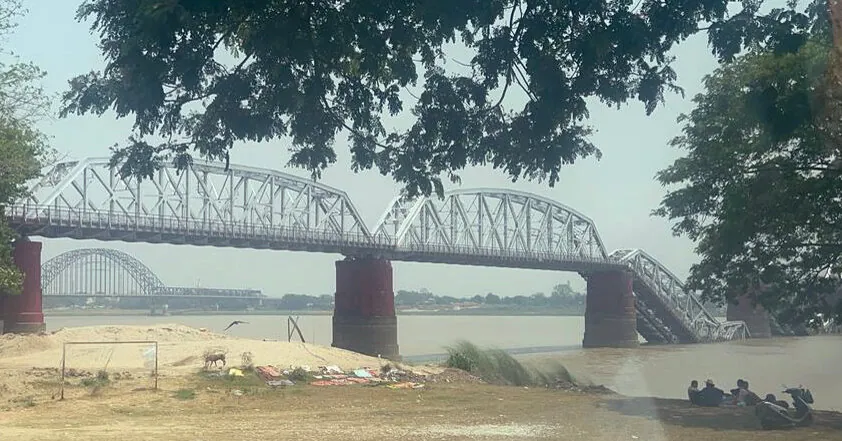
Soldiers Stifle Relief Efforts Following Myanmar's Devastating Earthquake
2025-03-31
Author: Wai
In a shocking twist to the humanitarian crisis in Myanmar, the earthquake that struck the remote city of Sagaing—registering a staggering 7.7 on the Richter scale—has turned into a heartbreaking tale of delayed rescue efforts and government obstruction. Nearly three days after the disaster, which has been hailed as the worst the nation has faced in over a century, the city’s 300,000 residents remain largely abandoned amidst shattered buildings and vital infrastructure, as the government employs military forces to control the situation.
The natural disaster exacerbated an already dire situation in Sagaing, where military forces have been engaged in a brutal civil war against rebel groups for four years following a coup. Roads have been rendered impassable, and safety concerns have led to the closure of critical bridges, trapping residents in an epicenter of misery. Adding to their woes, the military has censored internet access, further isolating these communities from necessary support and external communications.
While some international aid began trickling into neighboring regions such as Mandalay and Naypyidaw, local volunteers have reported that they are being systematically blocked from providing assistance in Sagaing. A resident, U Tin Shwe, expressed frustration at the military checkpoints preventing local efforts, stating, “Rescue operations can only be conducted with their permission.” This indifference has left countless trapped individuals, including monks under collapsed monasteries, without hope as the military prioritizes control over citizen safety.
As the death toll flared to officially reported figures over 2,000—although independent calculations suggest it could soar over 10,000—most of these victims reside in Sagaing, where over 80 percent of the urban landscape has reportedly been destroyed. The scene paints a grim picture: hospitals are overwhelmed, deceased inhabitants are laid out on the streets, and hundreds of survivors are left to sleep under makeshift shelters as food and water supplies dwindle to alarming levels.
In a surprising move, the junta has extended a call for international aid, yet observers believe this will be strictly regulated to align with military interests. Reports from the Centre for Ah Nyar Studies indicate that humanitarian efforts have been severely impeded, with multiple aid trucks left to idle overnight at military checkpoints. Recently, a trauma response team from Malaysia marked the first significant foreign aid arrival, an event both hopeful and tragic given the prevailing misery.
Sagaing has not only been affected by the earthquake; it has long been a battleground ravaged by military airstrikes and widespread violence. The region is home to more than 1 million internally displaced individuals, a staggering statistic highlighted by the UN Office for the Coordination of Humanitarian Affairs. It was reported that prior to the quake, 27 townships already suffered from inadequate access to essential services like clean water and electricity.
Experts underscore that the civilian population has lived through extreme terror tactics designed to intimidate, with reports of beheadings and other forms of brutal violence. The crisis remains dire, with residents like Win Mar sharing their harrowing narratives of loss—her family trapped in the rubble of their home, unable to be rescued until days later.
Internet disruptions due to military action have compounded the challenges, rendering the population voiceless as they struggle against the regime's chokehold on aid. Joe Freeman of Amnesty International highlights the grim reality: "Nothing is really getting there. We are mainly worried about aid being blocked by the military because it is their history and pattern."
As international attention turns towards Myanmar, the plight of Sagaing's citizens remains dire. The echoes of despair are clear, but action must transform from rhetoric to relief. Will the global community respond swiftly, or will the military’s iron grip continue to thwart humanitarian efforts? The world is watching.



 Brasil (PT)
Brasil (PT)
 Canada (EN)
Canada (EN)
 Chile (ES)
Chile (ES)
 Česko (CS)
Česko (CS)
 대한민국 (KO)
대한민국 (KO)
 España (ES)
España (ES)
 France (FR)
France (FR)
 Hong Kong (EN)
Hong Kong (EN)
 Italia (IT)
Italia (IT)
 日本 (JA)
日本 (JA)
 Magyarország (HU)
Magyarország (HU)
 Norge (NO)
Norge (NO)
 Polska (PL)
Polska (PL)
 Schweiz (DE)
Schweiz (DE)
 Singapore (EN)
Singapore (EN)
 Sverige (SV)
Sverige (SV)
 Suomi (FI)
Suomi (FI)
 Türkiye (TR)
Türkiye (TR)
 الإمارات العربية المتحدة (AR)
الإمارات العربية المتحدة (AR)